For a PDF version of this report, click here.
Late in the evening on June 30, 2017, the Washington State Legislature adopted one of the nation’s most comprehensive paid family and medical leave (PFML) policies. The vote was strongly bipartisan – 37 to 12 in the Senate and 65 to 29 in the House. Breaking rules and long-standing precedent, legislators and advocates stood and applauded when the final tallies were announced. Five days later, Governor Jay Inslee signed the bill into law, surrounded by a large and festive crowd of workers, business owners, lobbyists, children, legislators, and journalists.
In this era of hyper-partisanship, how did we pass a major new program through Washington’s sharply divided Legislature? There was no secret formula: For nearly two decades, we prepared, organized, sought new allies and listened to skeptics. We were willing to rethink policy and incorporate new ideas. We built the power and unity that pushed the issue to center stage. When the opening came, we were ready and seized it.
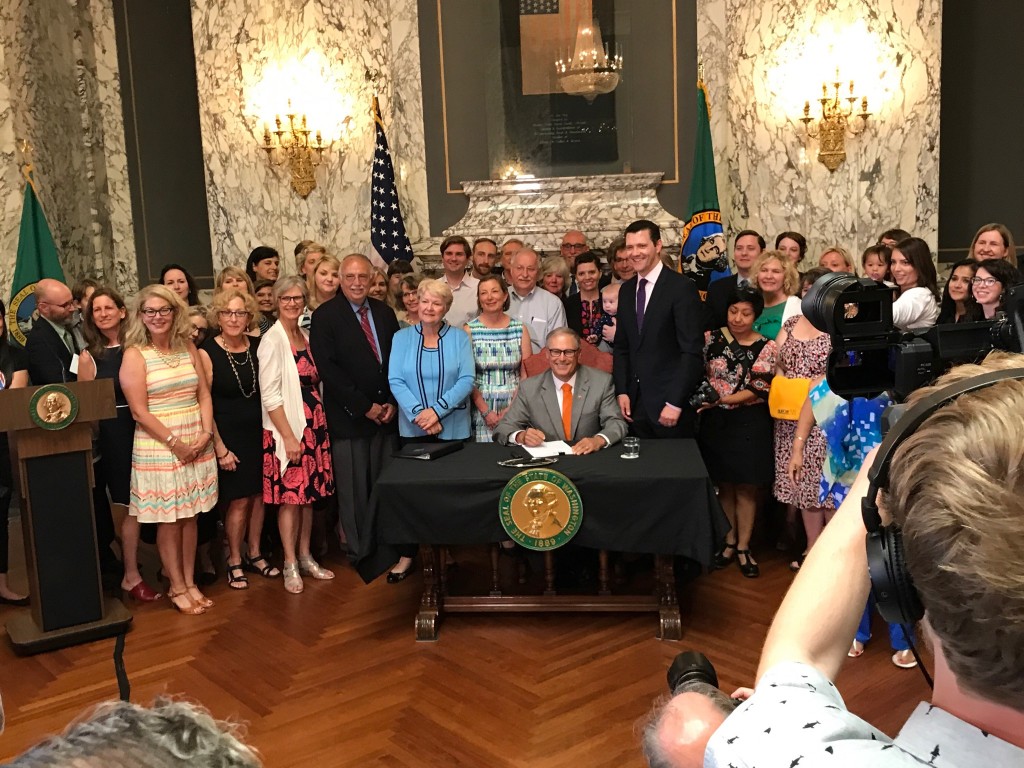
Washington Governor Jay Inslee signs paid family and medical leave into law surrounded by legislators, advocates, and business owners, July 5, 2017.
A long time coming
The Washington Work and Family Coalition has advocated for paid family and medical leave since 1998. When both parents have paid leave, babies and their mothers are healthier – both in the short and long run. Families are more economically secure and less at risk of poverty. Women are more likely to be in the workforce a year after giving birth and earning higher wages when they have paid maternity leave. People of all ages recover more quickly from serious illness or injury when loved ones are present and they have sufficient time and rest to heal. And with our aging population, more workers have eldercare responsibilities. Paid family and medical leave reduces health care costs and improves outcomes for everyone.
Businesses also benefit from higher morale, a more productive workforce, and less costly turnover.
Despite its advantages, the U.S. is the only economically developed country that does not guarantee workers paid maternity leave as well as ample paid medical and personal leave for other purposes. As a consequence, one in four U.S. women are back on the job within two weeks of giving birth. Too many people also struggle to maintain a full-time work schedule while undergoing cancer treatments, a loved one is hospitalized, or a parent is dying.
Five states – California, New Jersey, Rhode Island, Hawaii and New York – have decades-old temporary disability insurance programs that provide wage replacement for workers with serious illnesses or injuries, including pregnancy complications and recovery from childbirth. Over the past fifteen years, each of those states except Hawaii has added paid family leave to their programs. Washington has thus become the fifth state with paid family and medical leave and the first to do so without a disability insurance program to build upon.
Working through setbacks
Washington came close to establishing paid family leave in 2007, after several years of organizing by the Work and Family Coalition. The Legislature passed a paid leave policy for new parents that year, but stripped funding and leave for other purposes from the final bill. The coalition and legislators prepared a bill to expand and fund the program for the 2009 legislative session, but the Great Recession and its devastating impact on the state budget tanked any chance of success for several years.
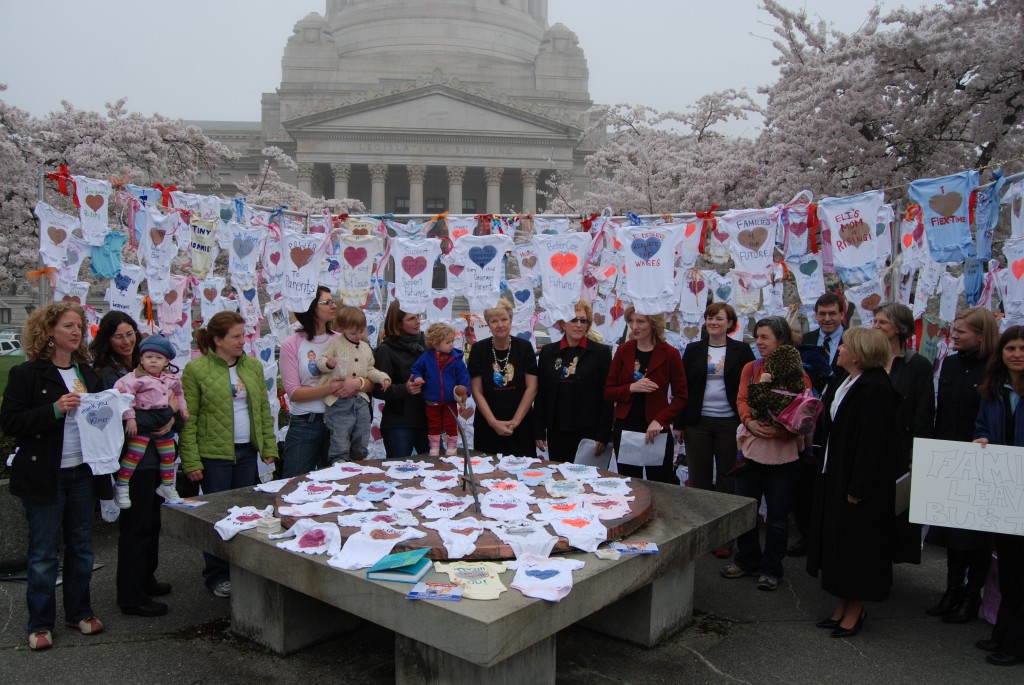
Onesies decorated by MomsRising members formed the backdrop for a 2007 Work and Family Coalition press conference outside the Washington State Capitol introducing an earlier version of paid family and medical leave.
At that point, the coalition shifted focus to organizing municipal campaigns for paid sick days. We hoped this strategy would improve public health and provide important new rights to workers. At the same time, it would build our base of supporters so we would have momentum and more power when we brought paid family leave back to the Legislature. We met with women’s and senior groups, labor leaders, business owners, health professionals, community organizations, and elected officials in several cities. Ultimately local coalitions successfully championed paid sick and safe leave ordinances in Seattle in 2011, Tacoma in 2015, and Spokane in 2016 – part of a string of dozens of local and state sick leave victories across the U.S.
The local successes proved to policymakers and key organizational leaders that public policy guaranteeing paid leave is both popular with the voting public and consistent with business prosperity.

Rally outside Seattle City Hall before key City Council committee vote for paid sick and safe days, August 2011.
Converging streams
In the aftermath of the economic crisis of 2008, with wages stagnating and income inequality continuing to soar, the fight for a $15 minimum wage caught fire nationally. Two signature campaigns achieved victories in Washington. A SeaTac ballot initiative combining the $15 minimum wage and paid sick leave won in 2013, and the Seattle City Council passed a $15 minimum wage ordinance the following year. Labor unions and other worker advocacy groups that participate in the Washington Work and Family Coalition led both of these campaigns.
In the Legislature, bills to raise the minimum wage and establish paid sick and safe leave statewide passed several times in the Democrat-led House only to die in the Republican-controlled Senate. In 2016, the Raise Up Washington coalition – which included most of the organizations in the Work and Family Coalition, took those two issues to the people in a ballot initiative. Washington voters approved Initiative 1433 with over 57% of the vote, including in districts where a majority supported Donald Trump and other Republican candidates.

Labor and community advocates gather in Washington’s Secretary of State office to file Initiative 1433, which would raise the state minimum wage and establish paid sick and safe leave standards statewide, January 2016.
Washington’s Work and Family Coalition also continued building support for statewide PFML. We worked with legislators to introduce a revamped and expanded policy in 2013 and again in 2015. In both years, committees in the House passed the bills, but not in the Senate. Even with limited progress, legislative activity allowed us to build and energize our coalition, collect personal stories, hold legislative hearings, educate legislators about the issue and policy options, and gain additional input on policy from small business owners, health professionals, and diverse communities.

Vancouver small business owner and Main Street Alliance president Don Orange testifies for paid family and medical leave during a 2013 legislative committee hearing, with Frank Irigon of Puget Sound Alliance for Retirement Action, father Mark Barfield, and Sarah Francis of MomsRising.
A flurry of employers announced expansions of their own parental leave programs in 2015 and 2016, especially in high-tech companies competing for talent, such as Microsoft and Amazon. The City of Seattle and King County were among public employers that approved expanding paid parental leave for their own employees.
National polls showed the issue was overwhelmingly popular with voters across partisan lines, and candidates of both parties proposed federal paid family leave policies during the 2016 presidential race. By 2016, several Seattle City Council members were publicly exploring options for citywide paid family leave for private sector employers in the city.
Not If, But When
By late 2016, there was a clear sense that the question was not if Washington would pass paid family leave, but when and how. Our coalition developed a new PFML bill based on best practices from around the country with our legislative champions, Senator Karen Keiser (D-Des Moines) and Representative June Robinson (D-Everett). The legislation proposed a state-run insurance program that would provide up to 12 weeks of leave for the worker’s own health condition and 26 weeks of paid family leave, with progressive benefits to assure affordability for low- and moderate-income workers, and premiums equally shared between employees and employers.
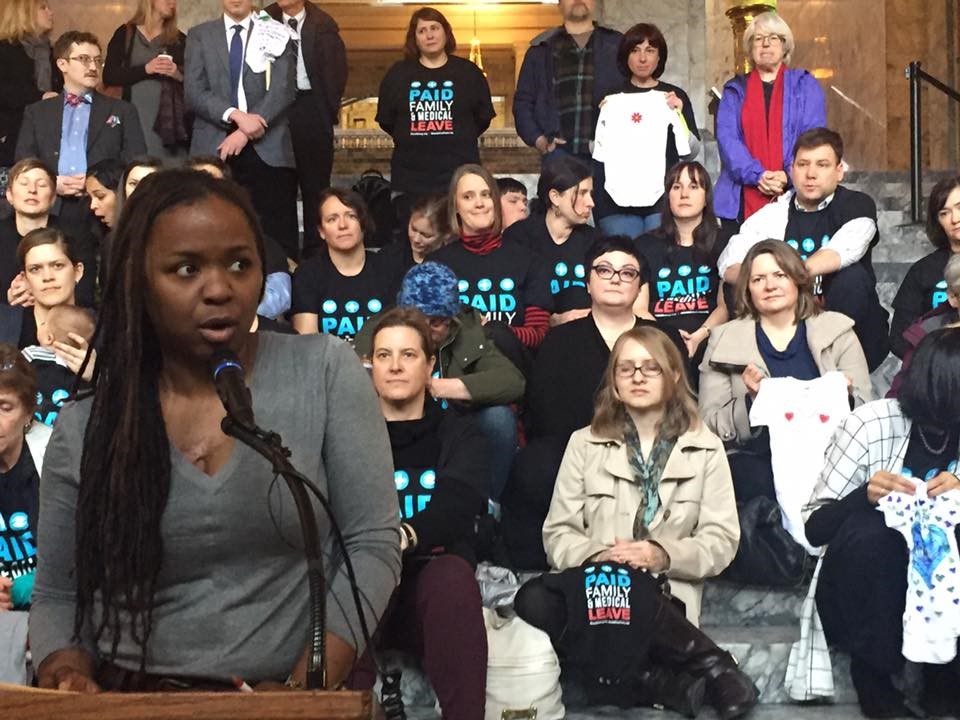
Small business owner Makini Howell speaks at Coalition and legislator press conference inside the Capitol building introducing paid family and medical leave bills, January 2017.
Nevertheless, chances looked slim that the Legislature would pass PFML during its 2017 session. As in the previous four years, Democrats held a narrow majority in the House, and Republicans a one-vote margin in the Senate – in a Majority Caucus that included one conservative Democrat. Most observers expected the session to be dominated by a partisan impasse over the state budget, with little progress on major policy issues.
Two developments created an opening. First, key members of the business lobby community in Olympia recognized that our coalition had the resources to run and win a paid family leave ballot initiative and indicated early in the session that they were prepared to come to the table and have a hand in drafting a PFML program for the state. Secondly, the Majority Floor Leader Senator Joe Fain (R-Auburn) introduced his own paid family leave bill after spending 12 weeks at home with his wife and newborn son the previous year.
With a well-respected Republican joining several Democratic legislators as ardent supporters of paid family leave, business community members ready to work out a deal rather than face a ballot initiative, and Work and Family Coalition partners determined to see a comprehensive program finally established, the stage was set. Legislators from both parties and chambers, seven representatives of the business community, and seven representatives of the Work and Family Coalition met in a remarkable series of negotiations. The discussions that ensued were often intense, at times passionate, but based on a spirit of problem-solving and mutual respect.
The fact that the House and Senate reached an impasse on budget negotiations proved a bonus. The Governor was forced to call three special sessions to finish the budget after the regular legislative session ended in mid-April, providing ample time to reach a deal. In the end, the Legislature approved both the budget and family leave on the last day of June.
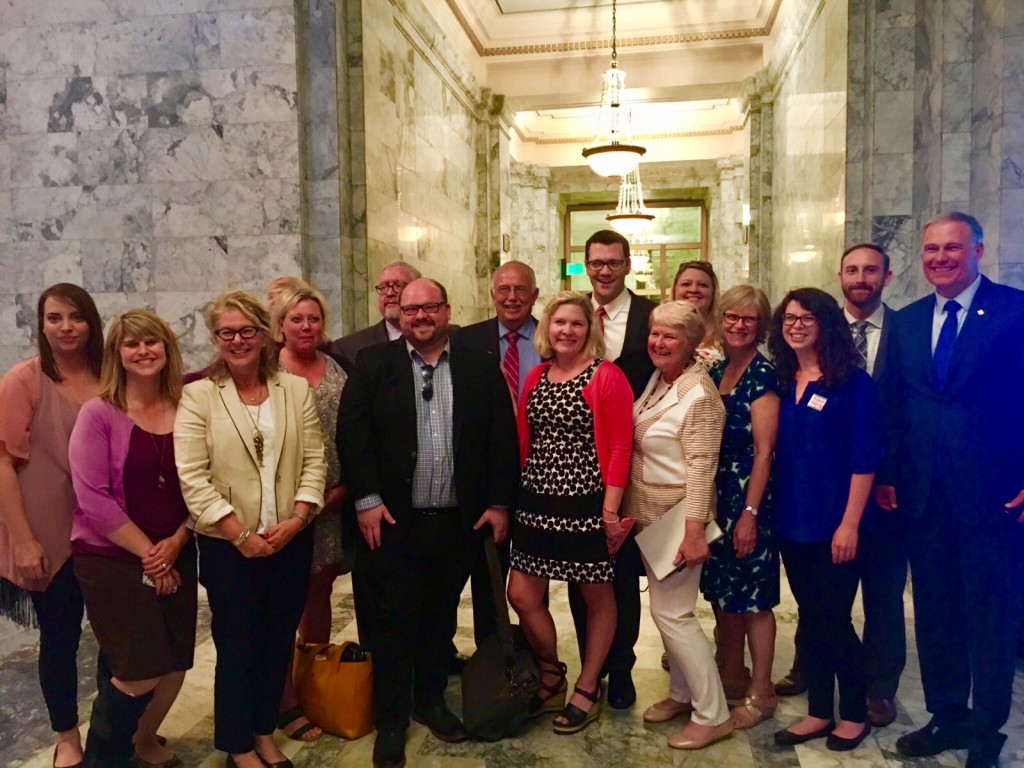
Coalition and business negotiators and the governor gather outside the Senate chamber to thank lead sponsors immediately after the Senate passed PFML. Left to right: Julia Gorton, Washington Hospitality Association; Holly Chisa, NW Grocery Association; Nancy Sapiro, Legal Voice; Lindsey Grad, SEIU 1199 (partly hidden); Brenda Wiest, Teamsters 117; Bob Battles, Association of Washington Business; Joe Kendo, Washington State Labor Council, AFL-CIO; Sen. Steve Conway, D-Tacoma; Rebecca Johnson, UFCW 21; Senator Joe Fain, R-Auburn; Senator Karen Keiser, D-Des Moines; Tammie Hetrick, Washington Retail Association; Marilyn Watkins, Economic Opportunity Institute; Maggie Humphreys, MomsRising; Nick Streuli, Washington Economic Security Department; Governor Jay Inslee.
Washington’s PFML Policy
Washington’s paid family and medical leave will operate primarily as an insurance program operated by the state. Beginning January 1, 2020, people who worked at least 820 hours for any employer in the previous year will be eligible for:
- Up to 12 weeks of family leave to care for a newborn or newly placed adopted or foster child or a family member with a serious health condition, or a family member’s military deployment.
- Up to 12 weeks of medical leave for the worker’s own serious health condition, with an addition 2 weeks for a pregnancy complication.
- Total combined leave in a year of 16 weeks (18 weeks with a pregnancy complication).
Benefits will be 90% of usual wages for lower income workers and top off at $1,000 per week.
Premiums begin in January 2019 at 0.4% of pay. Workers will pay 63% of the premiums, employers 37%.
Examples of Premiums and Benefits for Full-Time Workers
Business assistance:
- Companies with fewer than 50 employees are not required to pay the employer share of premiums, but may choose to do so to be eligible for small business assistance funds. Their employees will pay the same as they would in a larger company and receive the same benefits.
- Companies with fewer than 150 employees that pay employer premiums may apply for $3,000 to cover costs of training replacement workers, or up to $1,000 for other costs of covering work when someone is out on leave.
- Companies may opt to provide their own benefits of equal length and at least equal financial compensation and apply for a waiver from the state program. Self-employed people and contracted workers may opt in for a 3-year minimum period.
Lessons along the way
Each state has its own conditions, and every campaign is unique. However, lessons from Washington’s experience can help other states move forward.
Be in it for the long haul
At this point, most states won’t require 20 years to pass paid family and medical leave. Over the past decade, there has been a shift so that the general public across the U.S. perceives the lack of paid family leave as an issue public policy should address. Coalitions can now come together and build momentum more quickly. However, stakeholders and policymakers still need time to educate themselves about how different policy options are likely to affect outcomes for different groups. The implementation process is also critical to ultimate success and will require sustained commitment of stakeholders.
The Economic Opportunity Institute, a nonprofit policy center, has convened the Washington Work and Family Coalition (originally the Paid Family Leave Coalition) and has provided policy research and communications support for nearly two decades. Consistent funding from multiple donors, particularly through the Family Values @ Work network, has been essential to sustaining the work. Participation in FV@W has also provided opportunities to learn from the experiences of programs and coalitions in other states.
Build a diverse coalition
The Washington Work and Family Coalition grew over time as we worked for both paid sick leave and paid family and medical leave. Our diversity of partners brought a breadth of perspectives and political strengths. Organizations representing women, seniors, immigrants, low-wage workers, small business owners, communities of color, children, LGBTQ communities, faith communities, medical professionals, and others all contributed unique perspectives that strengthened our policy.
The diversity provided an array of messengers who could speak authoritatively with personal stories on how a PFML program would improve public health, family economic security, small business competitiveness, and health outcomes, particularly for infants and seniors. Allying with statewide groups and organizations based in different localities insured that legislators received emails, phone calls, and personal visits from their own constituents.
Some organizations officially joined the coalition, while others participated less formally – delivering information to their members, sharing stories, and speaking directly to legislators. Some groups contributed considerable staff time and insider political savvy. Others had specific policy expertise or strong bipartisan relationships. Some activated grassroots members to turn out for events or send in email messages. We worked with our partners to find the ways that they and their members could contribute most effectively.
Many of our organizations have worked together on other issues in other coalitions, and sometimes we disagree. However, most recognize that our commitment is not to a single campaign, but to building a more inclusive economy and democracy in Washington State where all families have the opportunity to thrive.
Washington Work and Family Coalition Organizational Endorsers
AARP Washington … LGBTQ Allyship … American Association of University Women of Washington … A. Phillip Randolph Institute … CASA Latina … Caring Across Generations … Children’s Alliance … Early Learning Action Alliance … Economic Opportunity Institute … Faith Action Network … IAM 751 … International Community Health Services … League of Women Voters… Legal Voice … MomsRising … National Organization for Women of Washington … OneAmerica … PTE 17 … Puget Sound Advocates for Retirement Action … Puget Sound Sage … SEIU 6 … SEIU 775 … SEIU 925 … SEIU 1199 … Seattle Human Services Coalition … Seattle Women’s Commission … SPEEA – IFPTE 2001 … Statewide Poverty Action Network … Teamsters 117 … Teamsters Joint Council … UFCW 21 … UFCW 367 … UFCW United Council … Washington CAN! … Washington Chapter American Academy of Pediatrics … Washington Physicians for Social Responsibility … Washington Senior Citizens’ Lobby … Washington State Alliance for Retired Americans … Washington State Association of Head Start/ECEAP … Washington State Coalition Against Domestic Violence … Washington State Council of Fire Fighters … Washington State Labor Council, AFL-CIO … Washington State Nurses Association … YWCA Seattle | King | Snohomish
Listen and empower
Personal testimonies motivated us to continue through years of disappointment and setbacks. We heard from people who were forced to return to work before they recovered from surgery, when their newborn was still in the hospital, or while they cared for a dying parent. We also heard about how they faced long term financial and health consequences because they lacked paid leave during a health crisis. Those stories inspired policymakers and sometimes encouraged us to rethink policy design to accommodate real-life scenarios.
We gathered community input in a variety of ways. In 2014 and 2015, our coalition coordinated with local groups to host ten forums on women’s economic security, including a focus on PFML, in cities around the state. We tabled and hosted workshops at labor conventions, spoke at forums and community group meetings, and met with leaders from diverse communities. Our coalition partners shared stories from their members, including MomsRising, which also organized a statewide paid family leave listening tour in 2016.
Our coalition partner groups encouraged and supported their members to participate directly in policy change through trainings, lobby days, email campaigns, and sharing their experiences publicly.
Engage diverse business voices
Listening to businesses improves policy design, and supportive businesses are usually essential to moving policy through the political process. When workers have the paid leave they need to keep themselves and their families healthy and economically secure, they are more productive and stay on the job longer, benefitting their employers as well. Pragmatically, if employers find a program like paid family and medical leave understandable and simple, their employees will have much easier access.
Our coalition leaders engaged with the business community in formal and informal ways over a number of years, sometimes through associations, more often one-on-one. We found that seeking input on policy design opened the door to more productive conversations than trying to sell people on the importance of paid leave. We met prior to introducing legislation with small business owners and representatives of key major employers to hear their perspectives on specific policy options, learn where they foresaw problems, and solicit their recommendations on possible solutions.
While we encountered some skepticism, we also heard repeatedly that business owners were committed to helping build healthy communities and many would welcome a low-cost tool such as paid family and medical leave insurance to help support their employees through tough times.
The formal negotiations and collective problem solving between worker advocates, legislators, and diverse business representatives that took place in 2017 produced both innovative policy design and a shared commitment to help guide the implementation process and see the paid family and medical leave program successfully launched.
Do your homework
In order for new programs to achieve equitable access and big improvements in health and economic security, advocates and policymakers need to go beyond the bullet points of the various models to understand the nuances of how policy elements interact. Fortunately, we now have a significant body of research from academics and policy experts on outcomes from – and shortcomings of – the existing state PFML programs, as well as knowledgeable people who are happy to share their expertise.
During the second term of the Obama administration, the U.S. Department of Labor awarded research grants to a number of states and localities to study paid family leave. The results of all of those studies are publically available. Washington received one of these grants in late 2015 that funded cost estimates on a number of policy alternatives and a public opinion poll which showed that three in four Washington voters supported adopting a state paid family and medical leave insurance program funded through payroll premiums. The coalition also conducted its own polling to test the strength of specific policy elements.
Our legislative sponsors also requested a Health Impact Review of their PFML bills, a tool available in other states as well, that provided a comprehensive literature review of the likely health and economic security outcomes of adopting a program.
Design policy based on broad input and core principles
Over the years, our coalition policy proposal evolved as we learned more about what people actually need and ways in which other state programs were succeeding and could be improved upon. We developed our 2017 policy proposal based on broad input and key values. Maintaining a focus on those values during the negotiations that followed helped keep our coalition united and clarified bottom lines.
For us, it was important that Washington’s PFML program:
- Insure every child has a solid foundation during the first months of life and support lifelong healthier outcomes – by providing sufficient length of both family and medical leave for both routine and complex situations.
- Promote family economic security across income levels, race, and gender – by providing progressive and sufficiently high benefits, with close to full wage replacement for lower-income workers, and covering a wide range of family types and needs.
- Be designed for the 21st-century workforce – by providing full portability between jobs, including every sector and employer, and being accessible to self-employed and “gig” workers.
- Support thriving businesses – by keeping the system as simple and low cost as possible for both employees and employers, and considering specific challenges faced by small businesses.
- Minimize cost and complexity – by relying to the extent possible on data already being collected by state agencies and definitions already in broad use.
Work closely with policymakers and agency staff
In addition to familiarizing legislators and the Governor’s office with PFML basics, we worked hard to educate a smaller core of legislators from both parties and staff about the implications of different policy choices on outcomes for different groups of workers, families, and businesses. That groundwork helped lead to a successful result in negotiations.
We have also learned over the years the importance of engaging early on the staff of the agency that will be responsible for implementing a policy once it is enacted. Especially in a program as complex as PFML, having agency input on the design of a program’s inner workings avoids problems and helps everything from passage through implementation go more smoothly.
Build a track record of success
The string of victories on paid sick leave and minimum wage that our coalition partners racked up beginning in 2011 assured that policymakers, business associations, and other key stakeholders and gatekeepers took our coalition seriously when we presented a united front around paid family leave.
Not every state has the possibility of running ballot initiatives, and some state legislatures have passed preemption laws that prohibit municipal action on paid sick days, minimum wage, and other labor standards. Advocates in every state will need to find their own path to building power.
Be receptive to new partners
We learned over the years not to make assumptions about someone’s position on paid family leave based on their party or organizational affiliation. We have also found that trying to understand and address the reasons behind concerns of skeptics and opponents can help strengthen a policy and its chances for passage. New partners can also provide important insights into strategy.
Stay nimble and communicate!
The best-laid plans can be made obsolete by one sudden event, and new opportunities can arise unexpectedly. Successful coalitions can be structured in a variety of ways, but must have built the trust and communications networks among leaders, key partners, and grassroots members to be able to make decisions quickly and keep united for the long haul.
Stay at the table and give people space
We could so easily have walked away or brought negotiations to a rancorous conclusion. It took time and effort to build trust at so diverse a table. Knowing we had other potential routes to victory kept our coalition negotiators resolved to win a strong policy, but past disappointments reminded us not to be cocky. Ultimately, we were successful both because both sides listened to each other and tried to understand each other’s issues, and also because each side gave the other the space it needed to process new information and bring its community along.
Say thank you and celebrate your victories
Success is sweet, most of all when shared. The Washington Work and Family Coalition thanked our membership profusely for all their contributions to success. We also thanked every member of the Legislature who voted in favor of our bill and encouraged partner organizations and grassroots supporters to send in thanks as well. We made the bill signing a festive community event, and later had a party withe awards for our legislative champions and the Governor.

A bubbly toast to victory.
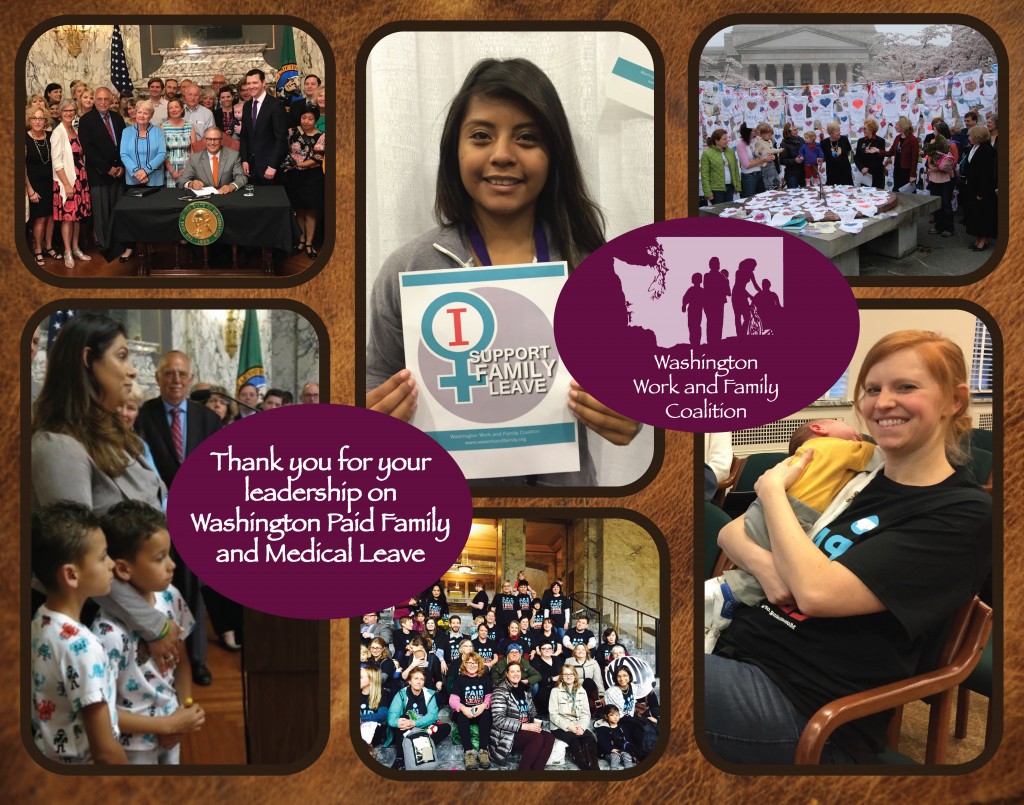
Thank you plaque for legislative leaders.
More To Read
January 17, 2025
A look into the Department of Revenue’s Wealth Tax Study
A wealth tax can be reasonably and effectively implemented in Washington state
January 6, 2025
Initiative Measure 1 offers proven policies to fix Burien’s flawed minimum wage law
The city's current minimum wage ordinance gives with one hand while taking back with the other — but Initiative Measure 1 would fix that
September 24, 2024
Oregon and Washington: Different Tax Codes and Very Different Ballot Fights about Taxes this November
Structural differences in Oregon and Washington’s tax codes create the backdrop for very different conversations about taxes and fairness this fall


Steve
This is not a win! This I theft by government to pay for people who have not made preparations themselves. I have no problem helping a person in need if they have done their best; but people who live off other people that do their part for society… I have nothing for them!
Dec 1 2018 at 3:45 AM
Sharrie
I think this plan should be a voluntary plan. I am 50 years, have had a uterine ablation, and will not be adopting.
Why should I pay into a plan that i will NEVER use.
It is just another way for Washington state to collect taxes and waste them.
If I have a medical event, I have prepared a savings account to cope. I don’t need even more money taken from
my check. I need the money, not the tax.
I want to opt out!
Jan 2 2019 at 9:59 PM
How The First Confirmed State With A COVID-19 Outbreak Used Paid Sick Leave To Slow Infection Rates – RSS feed
[…] extended leaves of 12-18 weeks for all workers within the state of Washington. “It took multiple years of organizing diverse coalitions and building power to win these victories,” Watkins adds, “and we […]
May 1 2021 at 1:06 PM